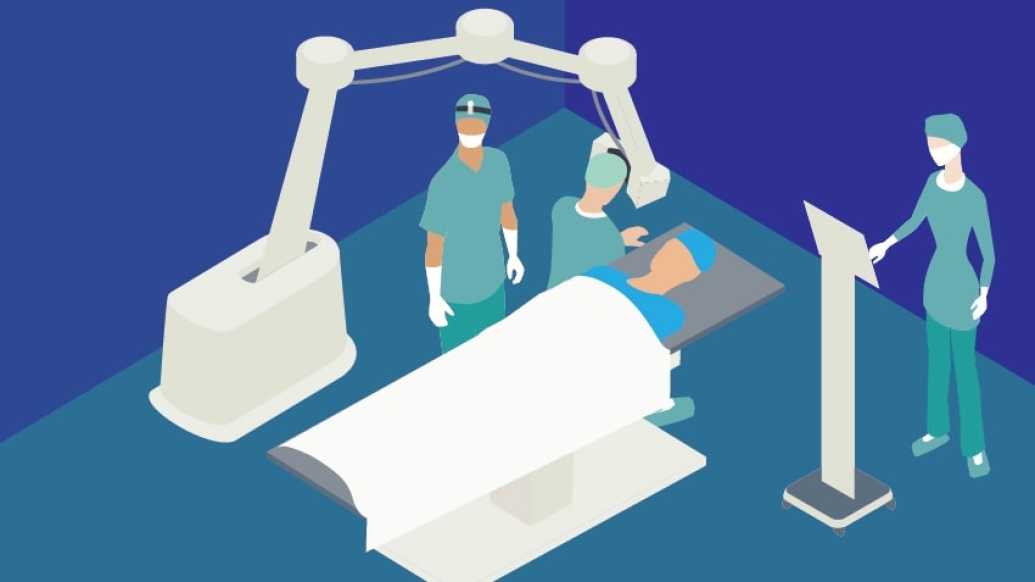Ocular surgeries are steadily shifting away from hospitals, a move that offers convenience and financial perks. But questions of safety and accessibility remain.
7:00 AM
Author |

The setting of many eye surgeries is shifting from hospitals to ambulatory surgery centers where care may be delivered at a lower cost, more quickly and closer to home for some patients, new national data show.
MORE FROM THE LAB: Sign up for our weekly newsletter
The migration has been significant: Ambulatory facilities performed 73 percent of cataract surgeries in 2014. But they handled only 43.6 percent in 2001.
University of Michigan Kellogg Eye Center researchers revealed the increase in JAMA Ophthalmology. The study analyzed claims data for 531,325 cataract surgeries in a nationwide managed care network.
"The increase in utilization occurred in many U.S. communities such that in some places nearly every cataract surgery took place in an ambulatory care center," says senior author Joshua Stein, M.D., an associate professor of ophthalmology and visual sciences at U-M and an eye policy researcher at U-M's Institute for Healthcare Policy and Innovation.
Still, he notes, more research is needed to determine whether there is any difference in safety between hospitals and surgery centers.
Perks and potential problems
Cataract surgery is effective in restoring focusing power that can deteriorate with age, and the procedure carries little risk. But well-equipped hospitals are more prepared than surgery centers if medical complications happen.
SEE ALSO: Telemedicine Could Improve Eye Exam Access for People with Diabetes
"The increased use of ambulatory care centers raises questions about access and the effect on surgical outcomes, patient safety and patient satisfaction," says Brian Stagg, M.D., the study's lead author and a clinical scholar at the Institute for Healthcare Policy and Innovation.
Reasons for the increasing popularity of ambulatory surgery centers include convenience, lower out-of-pocket costs for patients and decreased cost per case for insurers.
One analysis estimated that cataract surgeries performed at ambulatory surgery centers rather than hospitals saved Medicare $829 million in 2011.
Consumers benefit, too: The average copay for cataract surgery in an ambulatory setting was $190 in 2014 compared with $350 at a hospital outpatient department, the U-M authors write.
Patients were more likely to receive cataract surgery at an ambulatory surgery center if they were younger, had higher income and lived in states without certificate-of-need laws that regulate the number of ambulatory care centers permitted to operate.
Less affluent patients, however, may not be able to take advantage, even if they have health insurance. That's because wealthier patients were likelier to live in communities with more ambulatory care centers.
"In our study, older enrollees were more likely to have surgery in a hospital, suggesting that in selected patient groups, surgeons may feel more comfortable performing cataract surgery at a hospital," says Stagg.
More than cataract surgery
Like cataract surgery, other types of eye surgery are increasingly performed at ambulatory surgery centers rather than hospital outpatient units. The study found the shift is also affecting care of cornea conditions, glaucoma, retina issues and strabismus.
SEE ALSO: Report Reveals Prominence of Double Vision Complaints
The rise in ambulatory surgery center use for cataract surgery went up about 2.34 percent a year — similar to the rate of increase for strabismus surgery and retina surgery.
The only eye surgery with a faster rate of increase was glaucoma surgery. The proportion of glaucoma surgeries performed in ambulatory centers increased to 66 percent in 2014, a 3.26 percent annual increase since 2001.
The study is the first to report on rates of eye subspecialty surgeries and where they took place over time.

Explore a variety of healthcare news & stories by visiting the Health Lab home page for more articles.

Department of Communication at Michigan Medicine
Want top health & research news weekly? Sign up for Health Lab’s newsletters today!





